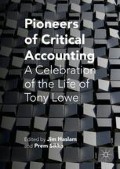Abstract
Major accountancy firms are a significant fraction of capital and exercise considerable influence on corporate governance, accounting, auditing and regulatory apparatuses. Their anti-social practices are frequently camouflaged with claims of ethical conduct and serving the public interest. This chapter shows that in pursuit of private profits accountancy firms have become key players in developing and marketing tax avoidance schemes which deprive the state of much needed revenues for social investment. On occasions the courts have declared some of the tax avoidance schemes to be unlawful. The firms remain addicted to avoidance schemes even though they have been fined and some of their personnel have received prison sentences. Following Tony Lowe’s edits, this chapter urges scholars to provide a critical scrutiny of the practices of major firms.
Access this chapter
Tax calculation will be finalised at checkout
Purchases are for personal use only
References
Accounting Standards (formerly Steering) Committee. (1975). The corporate report. London: ICAEW.
Action-Aid. (2010). Calling time: Why SABMiller should stop dodging taxes in Africa. London: Acton-Aid.
Adler, P., & Borys, B. (1996). Two types of bureaucracy: Enabling and coercive. Administrative Science Quarterly, 41, 61–89.
Agger, B. (2004). The virtual self. A contemporary sociology. Oxford: Blackwell.
Aglietta, M., & Rebérioux, A. (2005). Corporate governance adrift: A critique of shareholder value. Cheltenham: Edward Elgar.
Agyemang, G., & Lehman, C. (2013). Adding critical accounting voices to migration studies. Critical Perspectives on Accounting, 24(4/5), 261–272.
Allen, W. (1992). Our schizophrenic conception of the business corporation. Cardozo Law Review, 14(2), 261–281.
Amel-Zadeh, A., & Meeks, G. (2013). Bank failure, mark to market and the financial crisis. Abacus, 49(3), 308–339.
Andersen, N. (2003). Discursive analytical strategies: Understanding Foucault, Koselleck, Laclau and Luhmann. Bristol: Policy Press.
Andre, P., Cazavan-Jeny, A., Dick, W., Richard, C., & Walton, P. (2009). Fair value accounting and the banking crisis; shooting the messenger. Accounting in Europe, 6(1), 3–4.
Angier, N. (1999). Woman: An intimate geography. Boston: Houghton Mifflin.
Angier, N. (2007). The canon. Boston: Houghton Mifflin.
Annisette, M. (2003). The colour of accountancy: Examining the salience of ‘race’ in a professionalization project. Accounting, Organizations and Society, 28(7/8), 639–674.
Annisette, M., & Trivedi, V. (2013). Globalization, paradox and the (un)making of identities: Immigrant chartered accountants of India in Canada. Accounting, Organizations and Society, 38(1), 1–29.
Anthony, R. (1965). Planning and control systems: A framework for analysis. Boston: Harvard University.
Antonio, R. (1981). Immanent critique as the core of critical theory: Its origins and developments in Hegel, Marx and contemporary thought. British Journal of Sociology, 32(3), 330–345.
Armour, J., Deakin, S., & Konzelmann, S. (2003). Shareholder primacy and the trajectory of UK corporate governance. British Journal of Industrial Relations, 41(3), 531–555.
Armstrong, P. (1994). The influence of Michel Foucault on accounting research. Critical Perspectives on Accounting, 5(1), 25–55.
Arnold, P. (2009). Global financial crisis: The challenge to accounting research. Accounting, Organizations and Society, 34(6), 803–809.
Arrighi, G. (2010). The long twentieth century: Money, power, and the origins of our times. London: Verso.
Arrington, C. E., & Francis, J. (1989). Letting the chat out of the bag: Deconstruction, privilege and accounting research. Accounting, Organizations and Society, 14, 1–28.
Arrington, C. E., & Schweiker, W. (1992). The rhetoric and rationality of accounting research. Accounting, Organizations and Society, 17, 511–533.
Ashby, W. R. (1956). An introduction to cybernetics. London: Chapman and Hall.
Author information
Authors and Affiliations
Editor information
Editors and Affiliations
Copyright information
© 2016 The Author(s)
About this chapter
Cite this chapter
Sikka, P. (2016). Big Four Accounting Firms: Addicted to Tax Avoidance. In: Haslam, J., Sikka, P. (eds) Pioneers of Critical Accounting. Palgrave Macmillan, London. https://doi.org/10.1057/978-1-137-54212-0_13
Download citation
DOI: https://doi.org/10.1057/978-1-137-54212-0_13
Published:
Publisher Name: Palgrave Macmillan, London
Print ISBN: 978-1-137-54211-3
Online ISBN: 978-1-137-54212-0
eBook Packages: Economics and FinanceEconomics and Finance (R0)

